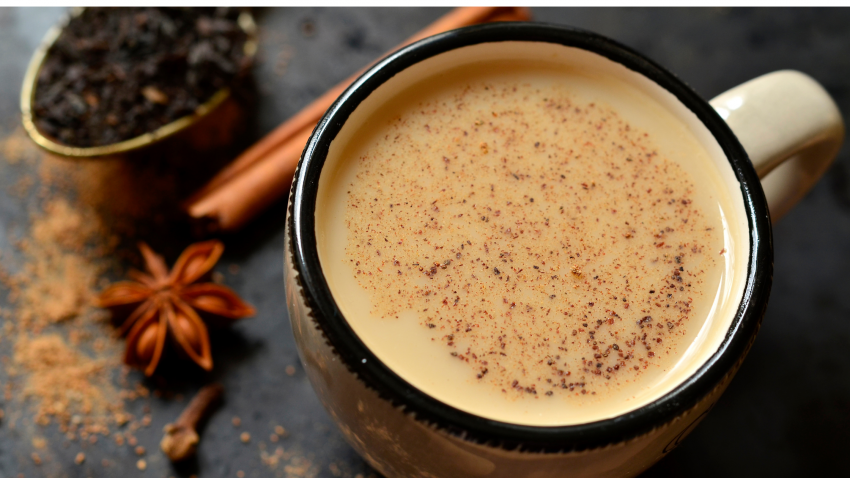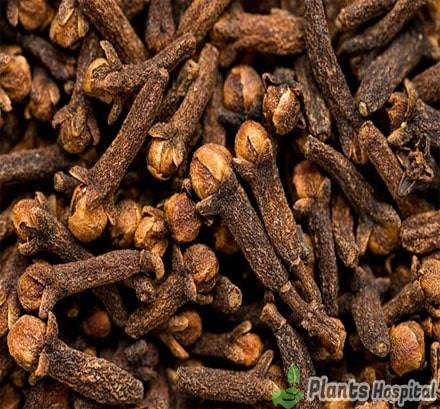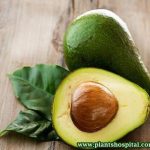Table of Contents
CHAI – WHAT IS IT?
Chai has a rich history. The term “chai” is taken from the Hindi word for “tea,” which in turn was borrowed from the Chinese word for “tea,” “cha.” The Hindi term chai refers to a mixture of spices steeped into a tea-like beverage. Chai recipes differ by continent, culture, town, and family. However, traditionally, spiced tea blends contain black tea and strong spices such as cinnamon, cardamom, cloves, ginger, and black peppercorns. The spiced tea mixture is often steeped strongly with milk and sweetened with sugar or honey. However, today’s milky sweet tea delight popular in coffee and tea shops bears little resemblance to the Indian Chai’s origins.
Chai origins
So, according to folklore, Chai emerged more than 5,000 years ago when a ruler in what is now India ordered the advent of a healing spiced beverage for use in Ayurveda. This traditional medicinal technique uses herbs and spices for healing. Ginger and black pepper were supposed to stimulate digestion; cloves’ antibacterial properties were considered to aid in pain relief; cardamom was believed to improve mood; cinnamon promoted circulation and respiratory health; and star anise was thought to refresh the breath.
As the beneficial beverage spread throughout India, a variety of spices were added to prepare it, depending on the region of the continent or even the neighborhood in where it was prepared.
Take it or leave it; the earlier forms of “masala chai” or “spiced tea” did not contain any Camellia sinensis tea leaves. In the subsequent years, milk and sugar were also added to the popular beverage. Thousands of years later (in the mid-1800s), when the Camellia sinensis assamica tea plant type was discovered in India and cultivated by the British, who colonized the continent and had an insatiable appetite for strong black tea with milk and sugar.
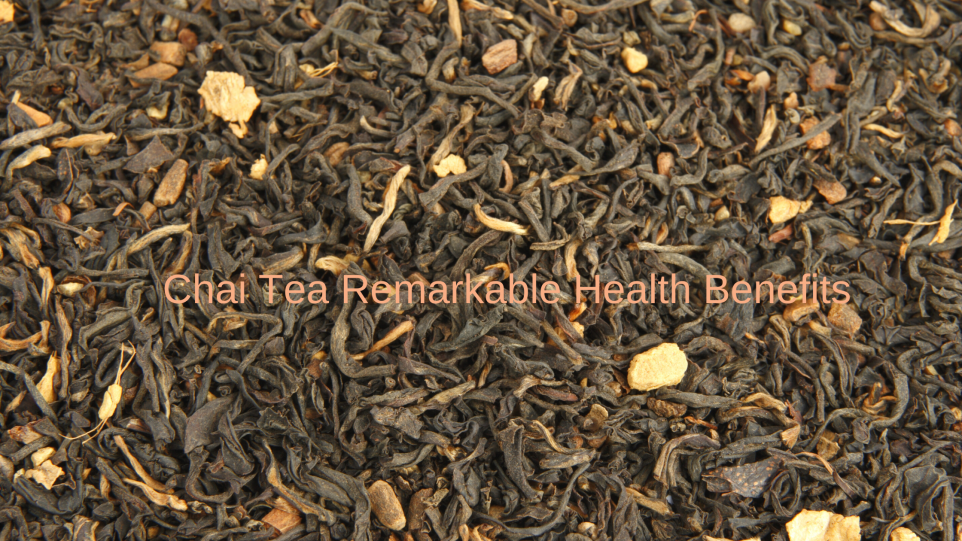
Chai’s ingredients
Because traditional chai beverages differ according to location and family, no single formula defines Chai. However, the beverage is often comprised of the following ingredient parts:
Tea: The Assam and Darjeeling black teas from India are often used chai bases. However, Chai can be brewed with various green teas, the South American plant yerba mate, or the South African herb red rooibos. Additionally, you can obtain herbal blends consisting entirely of spices and containing no tea leaves.
Sweeteners: While white sugar, brown sugar, and honey are the most common chai sweeteners, alternative sugars such as demerara, turbinado, or coconut sugar may also be used. Jaggery, made from unprocessed cane sugar, is a popular sweetener in some parts of India.
Milk: Often, Indian Chai is brewed using buffalo milk. However, the more Westernized variant is often made with milk or dairy substitutes such as soy, almond, rice, or coconut milk. Other chai beverages around the world may contain yak or goat milk. Certain recipes call for steeping a strong chai in water and dilution with milk. Other recipes call for simmering the chai spices in a water-milk mixture or all milk.
Spices: Spices, or “masala,” used in Chai will vary according to region, climate, and cultural preference. Historically, cardamom, ginger, cloves, cinnamon, and black peppercorns were the most popular chai spices, as they were all widely available in India. Additionally, some classic recipes may find vanilla, nutmeg, mace, star anise, and fennel. As Chai spread west, ingredients like bay leaf, spices, cacao, or saffron became popular. Coriander and cumin are also widely used in recipes.
Chai-testing
Due to the wide variety of chai recipes, the beverage can take on many flavor profiles based on the ingredients utilized. Chai made with a high proportion of ginger, and black peppercorns may have a smoky aftertaste. Others with a higher concentration of vanilla, cinnamon, or nutmeg may leave a sweeter aftertaste. Saffron or cacao-based products may add an earthy bitterness. Additionally, those containing fennel or cumin may have a more savory flavor.
As a reference to chai tea’s origins on the Indian subcontinent, chai tea is available in the more traditional, authentic Indian chai flavors. Our Chai is the perfect balance of smooth and spicy, made with black tea, ginger, cloves, cardamom, and cinnamon. While the ginger’s powerful spiciness and clove’s rich sweetness show through, the spices do not overpower our full-bodied black tea leaves. The Chai is equally delicious, steeped in water alone as it is with your preferred milk or sugar.
Caffeine ratio in Chai
Chai Tea has black tea and has a caffeine concentration comparable to that of black tea, which has around half the caffeine found in a cup of coffee. However, the caffeine content of each Chai will vary based on the amount of Camellia sinensis tea leaves used in the blend, the region where the tea plant was cultivated and processed, and the method used to make the Chai for your cup.
Brewing chai
Because chai blends may contain various tea bases and different teas have varying ideal brewing temperatures and steeping durations, always inquire about the particular brewing instructions for the Chai you purchased from your tea vendor. Consider the following common Chai making tips:
Chai can be simmered in water alone, in a water-milk mixture, or pure milk, depending on your preference. (You should never truly boil milk since it may scald or burn, imparting an awful flavor.)
If your Chai has particular brewing instructions, follow them. However, a safe guess is to use roughly 2 grams of loose leaf chai blend every 8 oz. cup of water/milk.
When brewing tea, always start with fresh, pure, cold filtered water. The purest water is spring water. Additionally, cover your tea during the steeping process to retain all of the heat in the steeping jar.
Here is one conventional way for brewing chai: Steep your chai blend in a quarter to a half of hot water for up to 5 minutes (for Chai made with black or green tea leaves) or up to 15 minutes (for Chai made with oolong tea leaves) (for an herbal chai). Meanwhile, bring the desired amount of milk to a barely-boiling temperature. Incorporate hot milk and sweetener of choice into the water-steeped chai mixture. Strain and take pleasure in.
Since with plain black or green teas, do not over steep chai blends that contain tea, as this may cause the tea leaves to release some bitterness and astringency. After the necessary steeping time has passed, taste your Chai and decide whether you’d like it to steep a bit longer.
If your Chai incorporates black tea, it should be steeped somewhat longer and at slightly higher water temperatures than green tea-based Chai. Generally, this is between 200 and 212 degrees Fahrenheit for three to five minutes. If your Chai contains green tea, simmer it at a lower temperature, between 170 and 190 degrees, for 3 to 5 minutes. (If you don’t have an electric kettle with temperature control, keep in mind that water simmers at 190 degrees Fahrenheit and boils at 212 degrees Fahrenheit at sea level.) The boiling point of water drops by roughly a degree for every 1,000 feet of altitude gain.)
Chai sourcing and storage
Like any other type of tea, a chai blend will not go “bad,” although it can become stale. To ensure you’re having the freshest Chai, get from a reliable source that can provide information about the Chai’s processing and packaging. With the following storage tips in mind, chai tea blends can stay fresh for up to a year:
- Tea should always be stored in a cool, dark place.
- Keep tea away from heat, light, air, and moisture, and never refrigerate tea.
- Tea will keep for a longer period if it is kept in an opaque, airtight container.
- Allow the tea to exist in a separate pantry from products such as coffee and spices, which can impart flavor to the tea leaves.
Not only does chai tea taste great, but it is also relatively healthy! Chai is made with various healthy ingredients, including black tea, ginger, cinnamon, cloves, and cardamom. While the specific spices in chai tea may vary, the following are some of the more popular spices used in chai blends.
Chai Tea Benefits
The following are just a few of the numerous benefits of chai tea:
Antioxidant-dense
Chai tea is an excellent source of antioxidants, which function to combat free radicals in the body, promote cellular health, and aid in preventing degenerative diseases and certain types of cancer. Like other forms of tea derived from the camellia Sinensis tea plant, Black tea is highly high in antioxidants. Additionally, cinnamon bark, cardamom, and cloves are antioxidant-rich.
Improves cardiovascular health
Chai tea’s ingredients have been demonstrated to boost heart health. Black tea includes flavonoids, a unique chemical responsible for much of black tea’s significant health benefits. In addition, flavonoids may help prevent plaque accumulation in the body’s arteries, thereby reducing the strain on the heart. Cinnamon has also been demonstrated to be beneficial in treating cardiovascular disease and reducing bad cholesterol.
Aids in digestion
Additionally, drinking chai tea can aid digestion and alleviate stomach discomfort. Consuming black tea has been shown to have a beneficial effect on digestion and can help prevent gastrointestinal problems when they do occur. Ginger is also a potent digestive aid, and its use can assist in alleviating gastrointestinal symptoms and support the digestive system’s correct function. Cardamom also contains a plethora of digestive aids!
Boosts vitality and alertness
Whether you’re searching for a caffeine boost in the morning or a boost throughout the day, black tea is a refreshing tea that can help boost alertness and focus. For example, black teas, such as chai tea, have a moderate quantity of caffeine to provide a pleasant boost of energy when you’re feeling sluggish, without the jitters or other harmful side effects associated with excessive caffeine consumption. When paired with the l-theanine found in tea, the caffeine in black tea aids in promoting focus and alertness.
Dermatologically beneficial
Black tea is high in various beneficial vitamins and minerals for the skin, including zinc, magnesium, and potassium, which all contribute to the skin’s protection and rejuvenation. Along with these beneficial compounds, tea is an excellent way to stay hydrated, which can help your skin appear healthy, fresh, and nourished. In addition, a daily cup of tea can assist in keeping your skin hydrated and healthy!
Decreases inflammatory inflammation
Chai contains anti-inflammatory ingredients, including black tea, ginger, cinnamon, and cardamom. Black tea can assist in reducing inflammation in the body, which can help to soothe muscle soreness and chronic pain and help prevent inflammation-related diseases such as arthritis, autoimmune disorders, and irritable bowel syndrome.
Cinnamon has also been demonstrated to aid in reducing inflammation and the alleviation of pain. Whether you’re experiencing transitory inflammation as a result of an injury or physical activity, or you’re coping with chronic inflammatory illnesses such as arthritis, a cup of cinnamon tea can have potent anti-inflammatory effects.
Ginger also contains anti-inflammatory properties and has been utilized in herbal therapy for ages due to its potent anti-inflammatory properties. Recent research confirms that ginger possesses potent anti-inflammatory effects.
Finally, cardamom is anti-inflammatory. These ingredients combine to make chai tea an excellent option for reducing inflammation!
Beneficial for your teeth
In comparison to other caffeinated beverages, which may contain an abundance of sugar, tea has been beneficial to oral health. According to studies, black tea has components that kill dangerous bacteria in the mouth, hence assisting in preventing plaque buildup. Additionally, ginger and cardamom have antimicrobial and antifungal characteristics that can aid in the eradication of dangerous oral diseases. This can assist improve your general health and ensure the safety and health of your teeth.
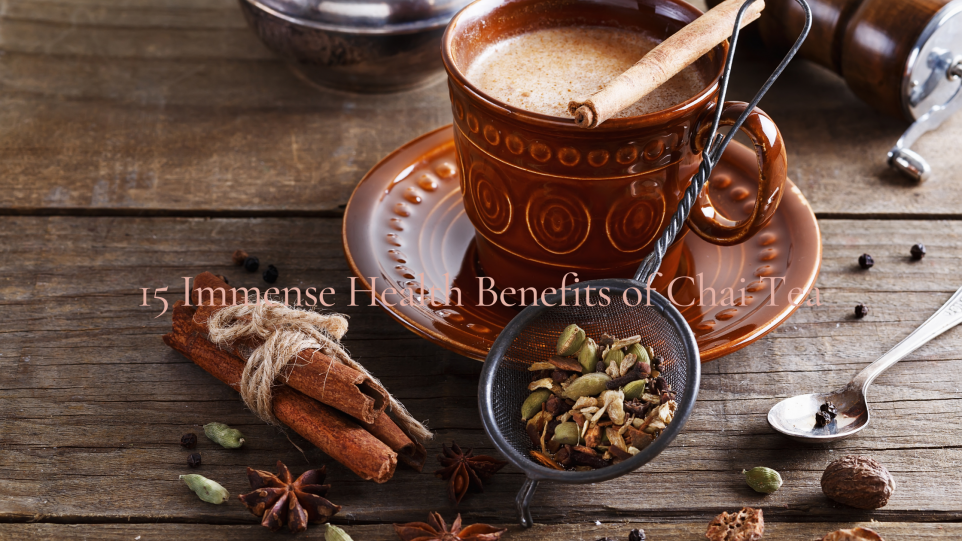
Protects against colds
If you’re feeling under the weather, a cup of Chai can help alleviate the common cold symptoms or possibly prevent them altogether. Catechins included in black tea have antiviral qualities, which may help prevent common illnesses such as colds and the flu. Ginger possesses antimicrobial characteristics that can aid in the battle against illnesses such as strep throat. In addition, cinnamon possesses unique antibacterial qualities that can help prevent infection and keep you safe and healthy. Additionally, cardamom and cloves have antibacterial and antimicrobial qualities, making chai tea an excellent choice for health protection!
Assists in the relief of headaches
Due to its low caffeine concentration, black tea is well known for relieving minor headaches. It constricts the blood vessels that are frequently the source of headaches, which can help soothe symptoms and pain. Caffeine in black tea may also assist in increasing the effectiveness of pain medications such as aspirin and ibuprofen. Tea consumers should use caffeine cautiously to cure headaches, as black tea can produce excess headaches.
Relieves menstrual cramps
A cup of chai tea can help alleviate period pain. Cinnamon has been found in studies to have a significant effect on relieving period-related symptoms. Cinnamon helps to alleviate menstrual pain, nausea, and bleeding and is a safe and effective treatment for painful periods. Ginger can be used to alleviate symptoms, including cramping. Indeed, one study suggests that ginger may be as effective as over-the-counter pain relievers such as ibuprofen. Another study discovered that ginger effectively reduced both the duration and intensity of period pain.
Beneficial for the brain
Did you know that drinking chai can aid with cognitive function and concentration? Cinnamon appears to have the potential to improve cognition and alleviate cognitive impairment in preliminary investigations. Ginger has also been demonstrated to aid in cognitive function improvement, and a cup of ginger tea can improve concentration and focus and increase energy.
Assists in the treatment of sore throats
If you have a sore throat, a cup of hot, spicy Chai will help soothe the symptoms. Black tea, ginger, cinnamon, cardamom, and cloves all have antimicrobial and anti-inflammatory effects that can help relieve a sore throat.
Stimulates the immunological system
Additionally, chai tea can help boost your immune system. Ginger possesses significant antibacterial capabilities that can assist in warding off hazardous infections and ensuring your safety and health. Ginger’s anti-inflammatory properties can also help keep your immune system in tip-top shape. Additionally, black teas such as chai tea contain catechins, which may help lessen the risk of viral infection.
Assists in nausea relief
A cup of chai tea can be a simple, effective approach to soothe nausea and settle an upset stomach. Ginger has been demonstrated to aid in the reduction of nausea and morning sickness connected with pregnancy and can help you feel better if you’re feeling queasy or suffering nausea.
Muscle pain relief
Do you have painful muscles? A delectable cup of chai tea can assist. Additionally, ginger has been demonstrated to reduce pain and soothe sore muscles. A recent study discovered that ginger could aid in treating muscle pain and soreness produced by exercise. Additionally, ginger has been demonstrated to help in treating chronic pain associated with injuries and disease.

